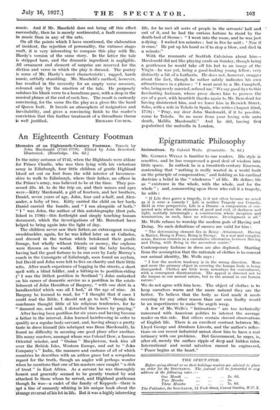Epigrammatic Philosophy
Intimations. By Gabriel Wells. (Constable. 7s. 6d.) Ma. GABRIEL WELLS is familiar to our readers. His style is sensitive, and he has compressed a good deal of wisdom into
little space. In outlook he is a twentieth-century Emerson, contending that " nothing is really wasted in a world built on the principle of compensation," and holding as his cardinal doctrine a belief in the " wholeness " of life. He defines life as " existence in the whole, with the whole, and for the whole " ; and, commenting upon those who call it a tragedy, he adds :
" If Life does prove a tragedy, is it not often because we acted as if it were a comedy ? Life is neither Tragedy nor Comedy. Held in true perspective, Life is a Drama—a composition of con- nected acts where the elements of good and evil, of darkness and light, zestfully intermingle ; a construction where inception and termination, as such, have no relevance. Development is all."
Mr. Wells refuses to worship the modern gods of Having and Doing. No such definitions of success are valid for him :
" The determining element lies in Being—Attainment. Having is Matter, Doing is Force, Being is Energy. In a real and complete sense, Success consists in a cumulative alternation between Having and Doing, with Being in the ascendant centre."
Contemporary fashions in dress arc also deplored. Starting from the assumption that the rationale of clothes is to conceal our animal identity, Mr. Wells says :
" I fear the modern tendency is in the wrong direction. More and more the primary object in covering the human body is being disregarded. Clothes are little worn nowadays for concealment, with a consequent disorientation. The appeal is directed not to the human in our animal nature, but to the animal in our human nature."
We do not agree with him here. The object of clothes is In keep ourselves warm and the more natural they are the better. To believe that the body as God made it needs
covering for any other reason than our own frailty would be an impertinence to make the angels weep.
A few of Mr. Wells's " Intimations " are too technically concerned with American politics to interest the average reader on this side. But others contain shrewd observations of English life. There is an excellent contrast between Mr. Lloyd George and Abraham Lincoln, and the author's reflec- tions on our recent industrial unrest show him to have a real intimacy with our problems. But Government, he urges, is, after all, merely the surface ripple of deep and hidden tides. International and social salvation cannot be engineered. " Peace begins at the heart."










































 Previous page
Previous page